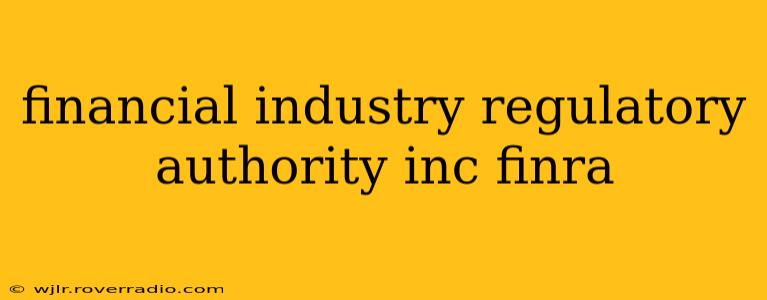The Financial Industry Regulatory Authority (FINRA) is a self-regulatory organization (SRO) that oversees broker-dealers and exchange markets in the United States. It's a critical component of the American financial system, working to protect investors and ensure market integrity. While not a government agency, FINRA operates under the oversight of the Securities and Exchange Commission (SEC), carrying out many of the regulatory functions that would otherwise fall directly on the SEC. This allows for more efficient regulation and a more focused approach to specific industry concerns.
What does FINRA do?
FINRA's primary responsibilities revolve around maintaining fair and efficient markets and protecting investors. This involves a wide range of activities, including:
- Examining broker-dealers: FINRA conducts regular examinations of broker-dealers to assess their compliance with regulations and industry standards. This includes reviews of their business practices, financial condition, and internal controls.
- Enforcing rules and regulations: FINRA enforces its own rules, as well as federal securities laws, through disciplinary actions against firms and individuals who violate these rules. Penalties can range from fines to suspensions and even expulsion from the industry.
- Arbitration and mediation: FINRA provides a forum for investors and broker-dealers to resolve disputes through arbitration and mediation. This offers a quicker and potentially less expensive alternative to traditional litigation.
- Licensing and registration: FINRA licenses and registers brokers and other financial professionals. This process involves background checks and testing to ensure individuals meet the necessary qualifications and suitability standards.
- Investor education: FINRA provides resources and educational materials to help investors make informed decisions and protect themselves from fraud. This includes a significant online presence offering various guides and tips.
- Market regulation: FINRA plays a role in overseeing the operation of the U.S. securities markets, working to ensure fair and orderly trading practices.
What is FINRA's role in protecting investors?
FINRA's investor protection efforts are multifaceted. They aim to prevent fraud, promote transparency, and empower investors with knowledge. Key aspects of their investor protection role include:
- Protecting against fraud and misconduct: FINRA investigates and takes action against brokers and firms engaging in fraudulent or unethical activities, safeguarding investor assets and preventing losses.
- Ensuring fair and ethical trading practices: FINRA's regulations and oversight aim to create a level playing field for investors, preventing manipulation and promoting fair competition.
- Providing investor education and resources: By offering free educational materials and tools, FINRA empowers investors to understand the risks involved and make well-informed investment choices.
- Providing dispute resolution services: FINRA's arbitration and mediation services offer investors a mechanism to resolve disputes with their brokers efficiently.
How is FINRA funded?
FINRA is funded primarily through fees charged to broker-dealers. This fee structure ensures that the cost of regulation is borne by the industry it oversees, rather than by taxpayers.
What are some common FINRA rules?
FINRA enforces a complex body of rules. Some commonly referenced rules relate to:
- Suitability: Brokers must recommend investments that are suitable for their clients' financial situations and investment objectives.
- Disclosure: Brokers must disclose all relevant information about investments to their clients.
- Conflicts of Interest: Brokers must disclose and manage potential conflicts of interest.
- Advertising: FINRA regulates advertising and marketing materials used by broker-dealers.
Understanding FINRA's role is crucial for both investors and those working within the financial industry. Its oversight helps ensure the integrity of the U.S. securities markets and protects investors from fraud and misconduct. For more detailed information, it is always best to consult FINRA's official website.
